The title of this posting comes from an old Chinese curse - May you live in interesting times - and that's what life has been like lately. Some of it has been very exciting - for example, the news that my new book The Chain Garden will be published by Robert Hale on 31st of July instead of - as I believed - the 31st August. But though this book, a Cornish family saga dealing with the fall-out from 30 years of secrets and lies, is very dear to my heart, it's not actually set during the Georgian/Regency period, so I mustn't say any more about it here!
On a more personal note, my younger son is getting married at the end of August. So many of the family will be going that we have more or less taken over a small hotel. As mother of the groom I have very little to do other than try to decide what to wear, and lend a sympathetic ear while he unloads the frustration of trying to organise table arrangements when certain people aren't talking to certain other people. I expect many of you are smiling in recognition.
Because of the hot weather interspersed with some very heavy showers the garden is flowering wonderfully, the tomatoes have formed fruit, but the grass is beginning to resemble a hay field.
My father will be 91 on July 16th and has decided to have a patio party. So far he's invited 21 and all have accepted. Now we have to decide what to give them to eat, and beg or borrow additional chairs so everyone who wants to can sit down.
Meanwhile I'm trying to get on with Devil's Prize. I'm currently working on Chapter 6 and have discovered some more fascinating facts about the smuggling of contraband. Many of the Cornish smugglers picked up cargoes of contraband from Roscoff. A helpful merchant would have ensured that the tubs of brandy were already roped together with a sinking stone attached. The reason for this was so that should the smugglers be chased by a revenue boat, as long as they were reasonably close to shore they could jettison the cargo overboard. This was called "sowing the crop." Provided the tubs didn't land on rocks the brandy would come to no harm underwater for a few weeks. Once the coast was clear, the smugglers would return with grapnels to "creep" for it. But because French rope was twisted the opposite way from English rope, once ashore it had to be burned as quickly as possible so it could not be used as evidence.
Jane Jackson.
Dangerous Waters Robert Hale March 2006 Available from www.Amazon.co.uk
The Chain Garden Robert Hale July 2006 Available from www.Amazon.co.uk
Friday, June 30, 2006
Thursday, June 29, 2006
Regency fashion never dates
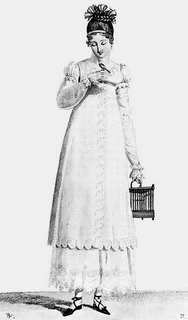
 Following our blog about Regency dresses being in fashion once again, we have just seen a very high profile Empire line gown.
Following our blog about Regency dresses being in fashion once again, we have just seen a very high profile Empire line gown.This beautiful Balenciaga gown was worn by Nicole Kidman at her wedding to Keith Urban, but it would have looked equally at home on Lizzy Bennet or Emma Woodhouse at their weddings to Mr Darcy or Mr Knightley.
Wednesday, June 28, 2006
Wicked Intentions - would you have the nerve?

Ruth Urswick’s father is insane. The only place she can find sanctuary from him is a Covent Garden brothel, and the only person who can help her is a dangerously attractive stranger. Ruth learns much more than any virgin should rightfully know at Mother Brown’s, but is that really a bad thing?
Oliver Bridgman, Earl of Iveleigh, is haunted by the tragedy that cut short his military career and nearly killed him. When he meets Ruth, he finds the bravery and beauty he’s been searching for all his life, but she needs his help.
Desperately.
If Oliver wants to win Ruth, he has to defeat a crazy man and take her as she is, penniless and friendless.
Georgian England provides the rich and colorful setting for this sexy, romantic adventure. How can you resist?
Oliver and Ruth certainly can’t!
WICKED INTENTIONS
One woman's plight leads to a love of all time.
1-933874-20-1
http://tinyurl.com/eqkog
Oliver understood. “More patience. More waiting.” She nodded. “At least,” he added, in an effort to placate her, “you know in the end you’ll get there.”
“It could be too late,” she said. “I’ll be five and twenty soon. No one has seen me, no one knows me. I can’t be a debutante; I’m too old for that. And if no one knows me, I have far less chance of achieving anything!”
She trembled, near to tears again and Oliver, anxious to avoid another bout of crying and deeply concerned for her, hastened to reassure her. “I think you have an excellent chance. You are lovely, something out of the ordinary and you are fresh. Your appearance the other night didn’t go unnoticed. You won’t be passed by, my dear. You underestimate yourself.”
She smiled at the compliment. “I hope so. But the thought of more time spent quietly in the country appalls me. I’m sorry, I know I shouldn’t be so ungrateful, but—“
Oliver stood up and came across the room to her, pulling her into his arms. “Just this once,” he said, more to assure himself than her, and he put his mouth to hers.
It was Ruth’s first adult kiss. She responded instantly, putting her arms around him, feeling his firm body, while his lips played softly on hers, inviting a response. She gave it, in full measure, innocence overcome by instinct.
This was what she wanted. Someone to call her own, someone who would treat her as an equal, someone kind and considerate. She hadn’t known that for years, but she knew it once and wanted it again. That was why she had accepted George’s proposal. Did Lord Iveleigh feel the same need she did? It blazed through her body the instant she opened her mouth to his. He held her close, ravaging her mouth, as though he was a dying man thirsting for water.
He drew gently away and stared at her. “See? That is why you mustn’t stay immured in the country, why you must get away from this place.”
Striding hastily across the room he left.
Ruth was left bewildered and once again, alone.
--
Lynne Connolly, The Return of the Gothic: Romance with a Dark Edge
JEWEL OF THE DRAGON, the first Department 57 book
Triskelion Author Page: http://lconnolly.notlong.com
Join my newsletter by sending an email to LynneConnolly-subscribe@yahoogroups.com
Website: http://www.lynneconnolly.com
Tuesday, June 27, 2006
Mr Knightley's Diary

One of my favourite parts of being a writer is seeing the cover of a new book for the first time. I've been really lucky with the covers of my Jane Austen retellings, as my publishers have let me choose the portraits.
The first one, for Darcy's Diary, generated a lot of talk, with people liking the idea of a portrait, but not always liking the portrait chosen, so I'm very interested to know what people think of this one.
Incidentally, it's a portrait of Robert Southey,(1774-1843) who was an English poet. I'll be blogging about him in more detail next month.
Choosing the portraits is an interesting experience. I've never come across a portrait that looks exactly like my idea of Mr Darcy or Mr Knightley, probably because they were fictional characters who were never painted! But choosing from the available portraits that are from the right period, show a man of the right age (a lot are of much older men), show him alone (a lot show men with their families) and show him without anything odd in the background - odd in the context of my books, for example an elephant - limits the choice substantially. However, I'm very pleased with this one.
Some of my friends think he looks miserable, some of them think he looks pensive, some of them think he has a look of Jeremy Northam (no bad thing) and I think he looks as though he's just got back from Box Hill. To me, his expression is just right for when Mr Knightley thinks that Emma is in love with Frank Churchill.
Let me know what you think! Can you see this as a portrait of Mr Knightley?
Mr Knightley's Diary will be out in August (October in the US). To pre-order Mr Knightley's Diary from Amazon, click here
To read a new extract, click here
Amanda Grange
Sunday, June 25, 2006
A DISSEMBLER - extract and launch plans
A DISSEMBLER
Chapter One
'What the devil do you want, Vincent, at this godforsaken time in the morning?' Theodolphus Archibald Frederick John Rickham, seventh Earl of Wister, known to his friends as Wister, or just Theo, yawned hugely and propped himself up on one elbow to scowl at his valet who had had the temerity to disturb him at dawn.
'I apologise, sir, but the man was most insistent that he speak to Sir James or Lady Devenish.'
Theo shot out of bed. 'Good God! This is a disaster. Did the man give his name?'
Vincent held out a brocade dressing gown liberally woven with gold and Theo slipped his arms in. 'I have some papers he gave me here, sir. He said they would explain everything.'
The bundle of papers disappeared into Theo's hand and he strode across to the candelabra. He flicked open the first and scanned its contents. He perused the next three, his eyebrows raised and his brow furrowed as he read.
'Vincent, what have you done with the young lady?'
'I asked Mrs Blake to conduct her and her abigail to the guest rooms in the east wing, sir. I couldn't leave her to sleep on the doorstep. The young men I sent round to the stables, they can find accommodation there.
'Excellent man, you did exactly the right thing. The young lady is, it says here, one Marianne Devenish, a great niece to Sir James and since her mother died she became his ward.'
Vincent looked grim. 'That has fairly put the cat amongst the pigeons has it not, my lord. What are you going to do?'
Theo flung the papers aside angrily. 'Quiet man, let me think, I cannot let the arrival of a stray schoolgirl ruin my plans.'
He ran his hand absently through his hair and chewed his bottom lip, deep in thought. Vincent left him to it, he knew it unwise to interrupt his master in such circumstances. He was better employed warming up some water and stropping the razor ready for his morning shave.
Theo paced the room, his long strides taking him across and back in easy rhythm. It was a conundrum of the most unlikely kind. Spies and villains, traitors and ne'er do wells he could deal with, but a girl, scarce out in society, that was quite a different matter.
Frowning he stared out of the window, the manicured lawns and elaborate old-fashioned knot gardens for once invisible to him. 'I have no choice, dammit! I cannot turn the child away but neither can I allow her to live here.' He spoke aloud, causing Vincent to pop his head round the dressing room door.
'Did you call, sir?'
'No, come in and sit down. I need to talk to you.'
With the ease of long acquaintance his manservant sat on a convenient chair and waited to be used, as many times before, as a sounding board for his lordship's machinations. Theo waited until he was settled.
'Good man. It says that Marianne is a substantial heiress and has been pursued by several gazetted fortune hunters and, according to her maternal grandmother, is in danger of finding
herself abducted by one of them. In desperation she has been sent here, supposedly out of harm's way, and placed in the care of her great uncle Sir James Devenish, whose long lost nephew and heir, I am supposed to be.'
'That's as maybe, sir, but it's a havey-cavey business, arriving in the middle of the night, with no luggage. Why did they not come in a carriage like normal folk?'
'According to this letter there is one bastard determined to have the girl, by force if necessary, and it was thought necessary to travel incognito. It seems it is my job now to keep her safe from him.'
'Well, that explains one mystery. But it does not solve the problem of how you are going to take care of her. You cannot tell her you are an impostor, can you?'
'No, I cannot. I have a vital job to do down here and must remain Sir Theodore Devenish until it is completed.' He paused, trying to make up his mind. 'I have no choice, Vincent. I must assume responsibility for the girl, become her guardian and administer her trust funds as requested. At least until this work is done.'
Vincent frowned. 'If she is a flighty miss, you may have to give up precious time to supervise her. And she can't stay here, this is a bachelor establishment; unless you can find an old tabby who can act as chaperone.'
'I had thought to foist her off on the Griersons at Frating Hall. They have a parcel of youngsters and will hardly notice one extra.' His valet was about to protest. 'I intend to offer them an extremely generous remuneration for accommodating her. Lord Grierson has his dibs permanently out of tune. He will snap my hand off in his eagerness to take my ward into his family.'
'Shall I get over to Frating Hall and inform Lord Grierson of your plans?'
'I shall write him a note explaining how things are. You can wait for his reply.'
'Very well, sir. Will you be wanting a shave before I leave?'
'I am quite capable of doing for myself.' Theo grinned. 'Do not forget that in private I am not the foppish Sir Theo, unable to do his cravat without assistance.'
Vincent got to his feet unabashed by the reprimand. 'I believe, sir, you always say that in order to bamboozle anyone successfully, the act must be kept up at all times, in case one is disturbed unexpectedly.'
'I have not the time to bandy words with you, I have a letter to write.'
I am delighted to be able to say that a stunning new shop, EVANS, (that stocks the kind of lovely things you don't know you need until you see them), in Great Bentley, where the book is actually set, has agreed to hold a 'Meet the Author' event on 2nd September for A DISSEMBLER. There is a village flower show on the green at the same time so I'm hoping some of the visitors will come in to see me and, hopefully, buy a book as well.
Fenella Miller
Chapter One
'What the devil do you want, Vincent, at this godforsaken time in the morning?' Theodolphus Archibald Frederick John Rickham, seventh Earl of Wister, known to his friends as Wister, or just Theo, yawned hugely and propped himself up on one elbow to scowl at his valet who had had the temerity to disturb him at dawn.
'I apologise, sir, but the man was most insistent that he speak to Sir James or Lady Devenish.'
Theo shot out of bed. 'Good God! This is a disaster. Did the man give his name?'
Vincent held out a brocade dressing gown liberally woven with gold and Theo slipped his arms in. 'I have some papers he gave me here, sir. He said they would explain everything.'
The bundle of papers disappeared into Theo's hand and he strode across to the candelabra. He flicked open the first and scanned its contents. He perused the next three, his eyebrows raised and his brow furrowed as he read.
'Vincent, what have you done with the young lady?'
'I asked Mrs Blake to conduct her and her abigail to the guest rooms in the east wing, sir. I couldn't leave her to sleep on the doorstep. The young men I sent round to the stables, they can find accommodation there.
'Excellent man, you did exactly the right thing. The young lady is, it says here, one Marianne Devenish, a great niece to Sir James and since her mother died she became his ward.'
Vincent looked grim. 'That has fairly put the cat amongst the pigeons has it not, my lord. What are you going to do?'
Theo flung the papers aside angrily. 'Quiet man, let me think, I cannot let the arrival of a stray schoolgirl ruin my plans.'
He ran his hand absently through his hair and chewed his bottom lip, deep in thought. Vincent left him to it, he knew it unwise to interrupt his master in such circumstances. He was better employed warming up some water and stropping the razor ready for his morning shave.
Theo paced the room, his long strides taking him across and back in easy rhythm. It was a conundrum of the most unlikely kind. Spies and villains, traitors and ne'er do wells he could deal with, but a girl, scarce out in society, that was quite a different matter.
Frowning he stared out of the window, the manicured lawns and elaborate old-fashioned knot gardens for once invisible to him. 'I have no choice, dammit! I cannot turn the child away but neither can I allow her to live here.' He spoke aloud, causing Vincent to pop his head round the dressing room door.
'Did you call, sir?'
'No, come in and sit down. I need to talk to you.'
With the ease of long acquaintance his manservant sat on a convenient chair and waited to be used, as many times before, as a sounding board for his lordship's machinations. Theo waited until he was settled.
'Good man. It says that Marianne is a substantial heiress and has been pursued by several gazetted fortune hunters and, according to her maternal grandmother, is in danger of finding
herself abducted by one of them. In desperation she has been sent here, supposedly out of harm's way, and placed in the care of her great uncle Sir James Devenish, whose long lost nephew and heir, I am supposed to be.'
'That's as maybe, sir, but it's a havey-cavey business, arriving in the middle of the night, with no luggage. Why did they not come in a carriage like normal folk?'
'According to this letter there is one bastard determined to have the girl, by force if necessary, and it was thought necessary to travel incognito. It seems it is my job now to keep her safe from him.'
'Well, that explains one mystery. But it does not solve the problem of how you are going to take care of her. You cannot tell her you are an impostor, can you?'
'No, I cannot. I have a vital job to do down here and must remain Sir Theodore Devenish until it is completed.' He paused, trying to make up his mind. 'I have no choice, Vincent. I must assume responsibility for the girl, become her guardian and administer her trust funds as requested. At least until this work is done.'
Vincent frowned. 'If she is a flighty miss, you may have to give up precious time to supervise her. And she can't stay here, this is a bachelor establishment; unless you can find an old tabby who can act as chaperone.'
'I had thought to foist her off on the Griersons at Frating Hall. They have a parcel of youngsters and will hardly notice one extra.' His valet was about to protest. 'I intend to offer them an extremely generous remuneration for accommodating her. Lord Grierson has his dibs permanently out of tune. He will snap my hand off in his eagerness to take my ward into his family.'
'Shall I get over to Frating Hall and inform Lord Grierson of your plans?'
'I shall write him a note explaining how things are. You can wait for his reply.'
'Very well, sir. Will you be wanting a shave before I leave?'
'I am quite capable of doing for myself.' Theo grinned. 'Do not forget that in private I am not the foppish Sir Theo, unable to do his cravat without assistance.'
Vincent got to his feet unabashed by the reprimand. 'I believe, sir, you always say that in order to bamboozle anyone successfully, the act must be kept up at all times, in case one is disturbed unexpectedly.'
'I have not the time to bandy words with you, I have a letter to write.'
I am delighted to be able to say that a stunning new shop, EVANS, (that stocks the kind of lovely things you don't know you need until you see them), in Great Bentley, where the book is actually set, has agreed to hold a 'Meet the Author' event on 2nd September for A DISSEMBLER. There is a village flower show on the green at the same time so I'm hoping some of the visitors will come in to see me and, hopefully, buy a book as well.
Fenella Miller
Friday, June 23, 2006
Deceived

Here is an extract from my new book, Deceived, which will be published on June 27th. I hope that you enjoy it!
Deceived is the story of the scandalous Princess Isabella Di Cassilis, obliged to marry her old flame Marcus Stockhaven to save herself from the debtor's prison:
Extract:
It felt quite wrong to be taking Marcus’s signet ring, wrong and too personal when she had wanted nothing more than his name on a piece of paper.
Marcus was watching her. She thought that there was amusement in his eyes. No doubt he found her predicament comical, the scandalous Princess Di Cassilis obliged to marry a debtor…
“Well?” He said.
“Thank you,” Isabella said, finding herself unable to look at him. “And you must take your ring back,” she added hastily, making to draw the gold signet ring from her finger where it had rested for such a short time.
Marcus shook his head, taking her hand and holding the ring in place. “Keep it,” he said. “Until we meet again.”
Isabella felt a pang of disquiet. “Will that happen?”
“Assuredly.”
“But not until we are safely unwed.”
Marcus’s smile deepened. “Of course.”
They stood looking at each other for a moment. Isabella felt strangely at a loss.
“I suppose that I should go?” She said uncertainly.
Marcus’s voice took a mocking edge at her obvious discomfort. “I suppose that you should. It is, however, customary to kiss the bride on the wedding day.”
Isabella’s nerves jumped. She put out a hand to ward him off.
“As you have reminded me, this is a business arrangement, sir, and that was not part of the bargain.”
Marcus smiled at her again. It was a lazy smile, full of intimate challenge. She was not sure whether he was doing this out of revenge or devilry or simply to amuse himself, but his proximity was enough to shatter her composure. She wanted to escape but she could not move.
The gaoler was becoming restive and fidgeting behind them, anxious to get his man back to the cells. Marcus ignored him. He took a single stride forward, caught Isabella’s arm and drew her to him. He bent his head. Then he was kissing her.
The pressure of his lips was no more than a whisper against hers. Even so, it was enough to cast Isabella back into the past, where the memory of his kiss had been locked away along with all the other tumbling images of passion. She had hidden those feelings from herself and from others for so long and now they were stirring, threatening to break out. Any tenderness that there had been between them might be long gone but the attraction still flared as hot as ever. It terrified her.
The sensual heat washed through her, burning her up, scorching her to the tips of her toes. Then it was all over and he had let her go with an abruptness that plunged her back into the empty darkness.
The atmosphere between them was blistering. Marcus’s face was dark and shadowed but in his eyes burned a flame that seared her.
“You should not-” She began.
His expression was hard. “It needed to be done.”
“Time to go,” the gaoler said, from behind them. He fingered the money in his pocket suggestively. “Unless you would prefer to stay a while longer, madam? A cosy cell for the two of you to celebrate wedlock-”
Wedlock. It sounded very final.
Nicola Cornick
www.nicolacornick.co.uk
Wednesday, June 21, 2006

Teeth are not the most romantic of subjects, but bear with me, because they give today's romantic novelist quite a problem.
A trip to the dentist today has made me think about teeth, and how we portray them in our Regency novels. When one considers the lack of hygiene and poor diet of the time it is hardly surprising that most writers of that age rarely mention teeth. There were of course chewsticks and hogshair toothbrushes, with salt, burnt bread or charcoal used for cleaning (I have also come across a recipe for a toothpaste made of dragon's blood, cinnamon and burnt alum, but this was the age of Enlightenment, so I hope our Regency forebears would have seen through this scam!). In all likelihood very few adults would have had a full set of pearly white teeth, and it is noticeable that no one ever smiles in portraits (George Washington is a good example – he had a set of wooden teeth, so he kept his mouth firmly closed!) There is one exception that I have found, a French lady, Madame Vigée Lebrun (above). She exhibited her self-portrait in the Paris Salon in 1787 and was widely condemned - she broke the convention that western artists only painted open mouths to display bad teeth or subject that were mad, bad or of low birth!
Of course, for the sake of Romance we must be allowed to indulge in a little fantasy: our heroine sees a flash of white as the rakish hero grins at her across a darkened carriage, or she may laugh and display her white, even teeth. Occasionally we allow our characters to have bad breath, or rotting teeth, but these are usually out and out villains.
Today we can have our teeth filled, cleaned, whitened, straightened and a host of other treatments designed to give us that dazzling smile. In Regency times the best they could do was to have someone else's teeth screwed in to their mouth. The poor who were blessed with a good set of molars would often sell them and after the Battle of Waterloo, women (and probably men too) scoured the battlefield, pulling teeth from the corpses: these were sold on to dentists for use by the rich in the capitals of Europe. It was a lucrative trade, and even if we sometimes mention this darker side of history in our books, I doubt if it will affect my heroes and heroines. They will of course be very strict about their oral hygiene and consequently have beautiful smiles!
Melinda Hammond
Monday, June 19, 2006
Guest blogger of the month - Anna Jacobs

Regular blog readers will know that each month we have a guest blogger. This month we are delighted to welcome Anna Jacobs. Anna hails from the UK, but now lives in Australia, where she can see dolphins from her window. I'm jealous! Although she lives down under in Australia, Anna writes stories set 'up over' in Lancashire. Here, Anna talks about her writing and her books. Over to you, Anna.

"Star of the North" is published in paperback at the end of June. It's the second of my four books about the early days of the music hall (set in the mid-1840s) and has my favourite cover of all my books (36 so far). I wasn't intending to write about music halls, as there have been quite a few books about young women with golden voices making good, and I like to find some different aspect of history as background for my stories. But when I was doing some research into the mid-nineteenth century, something clicked for me.
Music halls started out as singing rooms in pubs - just amateur nights where
anyone could perform. Then they got a bit fancier and became concert rooms
or music saloons (usually attached to pubs) before eventually becoming
proper theatres and acquiring the name music hall. And apart from London,
Lancashire had more music halls than anywhere else in England. So I invented
a town (Hedderby), then the Preston family - very poor, with ten children -
and the pub whose singing room turns into a music saloon. The story which
became "Pride of Lancashire" (currently shortlisted as Australian Romantic
Book of the Year) set off at a gallop, a sheer pleasure to write, and led to
three other books. Each is about a different member of the Preston family -
and about the gradual development of a proper music hall that becomes in
Book 4, the "Heart of the Town".

Marjorie Preston is the heroine of "Star of the North". (Did you know "star" was used in the 1840s in the same way it is now, for top entertainers?) She's the prettiest of the sisters and wants desperately to go on the stage, but hasn't a strong enough voice - remember this is in the days before microphones. When she gets a chance to become stage assistant to Denby Sinclair (her main purpose to look decorative), who is making a name for himself as a singer, she takes it, against her family's wishes. But he has a secret which ruins her life and leaves her in dire need, far from home. And the music hall in Hedderby is under threat, too . . .
I so enjoyed writing my four music hall stories. I'm taking a break from them now, but I'll definitely write more about Hedderby later. Currently I'm writing a couple of books set just after World War I, when people tried to send women who'd done unusual jobs during the war back to their old restricted lives. In 1918 women were at last given the vote - if they were over 30 and owned property - while men's only qualification for voting was to be 21. Such a fascinating period! In fact, the history of ordinary women (who often did extraordinary things) has become quite a passion with me, as you'll see if you read my books.
To find out more about Anna Jacobs, visit Anna's website
Her books can be found in bookshops or on Amazon
Friday, June 16, 2006
Duty's Destiny
When I last posted on this blog I was in The Bahamas, being inspired by tales of pirates and privateers. I'm still living afloat and am now sweating my way up the east coast of The States, avoiding hurricanes and concentrating upon my writing with a tenacity that my husband wishes I would apply to boating!
I had the pleasure of seeing my first book, Lady Hartley's Inheritance, published by Hale in April, although being hard to contact it was also frustrating, knowing my family had seen the book and I had not!
My second book, Duty's Destiny, is being published by Hale in November. It is a tale of smuggling during the Regency period, but was written even before I set foot in The Bahamas, so I guess I must have had pirates on my mind even before then!
Whilst cruising I also finished my next one, The Social Outcast, printed it off on the boat and submitted it to Hale. It too has been accepted and I am about to embark, literally, upon my next one, which has a working title of A Duchy Divided. It charts the fortunes of a young heiress, whose lauch into society is blighted by the knowledge that someone intends to do her harm. Aware that Lord Sebastian Devner has a reputation as an aristocratic detective, Aligail decides she must seek his assistance, to discover who it is that bears her a grudge. Unfortunately though, investigation is not the only reputation that Sebastian has earned for himself and so how can Abbey possibly even approach such a man, without hopelessly compromising her own reputation?
I'm not too sure of the answer to that one myself yet, but it will come to me! Unlike some writers, who carefully chart out each chapter before writing it, I start by books with only the vaguest notion of how they are going to finish up, allowing my characters to take on lives of their own and following in whichever direction they lead me. No doubt they will surprise me on this occasion as well, hurricanes always permitting, of course.
Wendy Soliman
I had the pleasure of seeing my first book, Lady Hartley's Inheritance, published by Hale in April, although being hard to contact it was also frustrating, knowing my family had seen the book and I had not!
My second book, Duty's Destiny, is being published by Hale in November. It is a tale of smuggling during the Regency period, but was written even before I set foot in The Bahamas, so I guess I must have had pirates on my mind even before then!
Whilst cruising I also finished my next one, The Social Outcast, printed it off on the boat and submitted it to Hale. It too has been accepted and I am about to embark, literally, upon my next one, which has a working title of A Duchy Divided. It charts the fortunes of a young heiress, whose lauch into society is blighted by the knowledge that someone intends to do her harm. Aware that Lord Sebastian Devner has a reputation as an aristocratic detective, Aligail decides she must seek his assistance, to discover who it is that bears her a grudge. Unfortunately though, investigation is not the only reputation that Sebastian has earned for himself and so how can Abbey possibly even approach such a man, without hopelessly compromising her own reputation?
I'm not too sure of the answer to that one myself yet, but it will come to me! Unlike some writers, who carefully chart out each chapter before writing it, I start by books with only the vaguest notion of how they are going to finish up, allowing my characters to take on lives of their own and following in whichever direction they lead me. No doubt they will surprise me on this occasion as well, hurricanes always permitting, of course.
Wendy Soliman
Thursday, June 15, 2006
"A sweet and charming romance"
Coffeetime Romance have just reviewed my first Regency ebook, Fateful Deception and awarded it 4 cups ("a keeper").
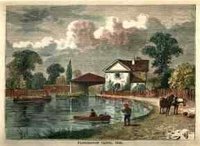 Fateful Deception was issued originally as a DC Thomson paperback and my first novel I got a publishing contract for. It's an adventure story about a lost heiress and the hero is a dragoon captain of Anglo-Irish descent. It was short-listed for the 2005 RNA New Writers Award. (Picture shows the Grand Juction Canal c1820 which is one of the methods of transport used in the story!)
Fateful Deception was issued originally as a DC Thomson paperback and my first novel I got a publishing contract for. It's an adventure story about a lost heiress and the hero is a dragoon captain of Anglo-Irish descent. It was short-listed for the 2005 RNA New Writers Award. (Picture shows the Grand Juction Canal c1820 which is one of the methods of transport used in the story!)
The reviewer at Coffeetime Romance writes:
"Lucinda and Robert are a wonderful Regency couple and their open and frank, while respectful, communication makes them empathetic from the beginning pages of the book. They are fully developed and I enjoy how well they know their place in society and how this influences their actions. As the love between them grows, their dialogues develop accordingly. The societal rules that challenge them are written into the plot wonderfully... The villain is very well written and a perfect foil for Robert’s straightforward military guise, and his regard for Lucinda for who she is as a person. The sub-plots are great and add to an already strong storyline. As a true Regency, the sexuality is more sensuous than blatant, while being wonderfully entertaining. I can easily recommend this as a sweet and charming romance, that readers will enjoy."
Read the whole review here.

Fateful Deception is available to purchase from publisher Belgrave House and ebook retailers including Fictionwise.
 Fateful Deception was issued originally as a DC Thomson paperback and my first novel I got a publishing contract for. It's an adventure story about a lost heiress and the hero is a dragoon captain of Anglo-Irish descent. It was short-listed for the 2005 RNA New Writers Award. (Picture shows the Grand Juction Canal c1820 which is one of the methods of transport used in the story!)
Fateful Deception was issued originally as a DC Thomson paperback and my first novel I got a publishing contract for. It's an adventure story about a lost heiress and the hero is a dragoon captain of Anglo-Irish descent. It was short-listed for the 2005 RNA New Writers Award. (Picture shows the Grand Juction Canal c1820 which is one of the methods of transport used in the story!)The reviewer at Coffeetime Romance writes:
"Lucinda and Robert are a wonderful Regency couple and their open and frank, while respectful, communication makes them empathetic from the beginning pages of the book. They are fully developed and I enjoy how well they know their place in society and how this influences their actions. As the love between them grows, their dialogues develop accordingly. The societal rules that challenge them are written into the plot wonderfully... The villain is very well written and a perfect foil for Robert’s straightforward military guise, and his regard for Lucinda for who she is as a person. The sub-plots are great and add to an already strong storyline. As a true Regency, the sexuality is more sensuous than blatant, while being wonderfully entertaining. I can easily recommend this as a sweet and charming romance, that readers will enjoy."
Read the whole review here.

Fateful Deception is available to purchase from publisher Belgrave House and ebook retailers including Fictionwise.
Befreckled Beanpole Seeks Handsome Hero

Miss Decima Ross is tall, befreckled and the despair of her family - who will not take the hint and persist in trying to marry her off, however many gentlemen make it quite clear she is not the bride of their dreams.
Fleeing her brother's latest insensitive plotting, Decima finds herself not just in a snowdrift, but in the arms of a man who seems to find her height a matter of indifference and her freckles positively attractive.
And, cut off by the snow, Adam Grantham, Viscount Weston, has several days to act on that attraction. Decima returns his passion - until she discovers that he was escaping his own family's attempts to matchmake - with her.
By the time Adam finds her again he is, most inconveniently, betrothed to someone else - is even his ingenuity enough to get himself out of this fix with honour intact?
Mills & Boon July 2006
Louise Allen
More on Regency fashion

Lois commented on the comfort of Regency gowns. I've always thought they looked very comfortable, but having never worn one, I couldn't say for sure. The corsets were certainly a lot less restrictive than they had been in previous centuries, because once the waistline was lost there was no need for women to cinch their waists in. In the above illustration, the woman seems to be wearing a chemise but no corset.
One of the curious things is that the climate of England didn't change, yet within a very short space of time, dresses went from being heavy items, made of thick fabric, to dresses that were so thin they were transparent. The changing fashions were mocked in this caricature of the time:

The writing on the caricature says:
The year 1740 A lady full dress of Bombazeen (bombazeen was a very heavy fabric) -
The year 1807 A lady undress of Bum-be-seen
Tuesday, June 13, 2006
Regency dresses


It isn't just Regency shoes that would fit easily into today's wardrobe, Regency dresses would fit there just as well. Here in the UK, high-waisted dresses are in fashion again.
Without the petticoat and the long sleeves, the 1813 dress on the left would pass without comment on the high street, and the 1810 ball dress at the right would need no alteration to blend in.
Saturday, June 10, 2006
James Purefoy as Beau Brummel


It has come to this Regency author's notice that a notoriously handsome actor named James Purefoy will be playing in a new television drama the man who is credited with having transformed gentleman's clothing into the refined and understated style that's stuck even into the present day: Beau Brummel, dandy and friend of the Prince Regent.
Beau Brummel: The Charming Man will broadcast by BBC television on Monday 19th June at 9pm.
Pictures courtesy of bbc.co.uk
Friday, June 09, 2006
SHOES AND 'THE MESALLIANCE'

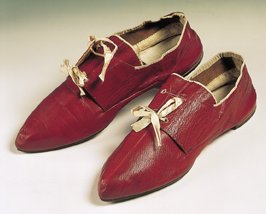
Regency shoes are so similar to the ones we wear today that either of these pairs could easily fit into today's wardrobe. However the fact that there was no distinction between left and right would have made them rather uncomfortable to wear- at least until the soft leather moulded to the shape of the foot.

I am delighted to be able to tell you that Robert Hale have bought my fourth book, The Mesalliance, the one set in St Osyth Priory. As usual it took Mr Hale less than ten days from sending the book to receiving the advance- it is a joy to work for a company that responds so fast. I know that other publishers can take months to get back to you with a decision. And, if they want to see the complete manuscript, you could be in for another very long wait. THE MESALLIANCE will be released early in 2007 and is a sequel to A DISSEMBLER which comes out in August this year.
FENELLA MILLER
Regency recipe - syllabub
Regency romances often feature dinner parties or picnics, allowing the characters to eat some of the popular foods of the period. One of the best loved Regency desserts was syllabub. So, as the sun is shining here in England - at last! - here's a Regency recipe that's just right for summer.
Serves 4-6
55 g caster sugar
1/2 teaspoon nutmeg
2 teaspoon each finely grated lemon and orange zest
2 tablespoon brandy
275 ml double cream
125 ml white wine or a mixture of sherry and white wine
Sprinkle the sugar with the nutmeg, grated lemon and orange zest and the brandy. Leave overnight.
Whip the cream until firm, then add the flavoured sugar mixture. Whisk again until the cream is thick.
Add the wine, whip the syllabub again until smooth. Taste. Sweeten it with a little extra sugar, if desired.
Spoon into glasses or serving dishes and chill for several hours.
Serve with macaroons.
Serves 4-6
55 g caster sugar
1/2 teaspoon nutmeg
2 teaspoon each finely grated lemon and orange zest
2 tablespoon brandy
275 ml double cream
125 ml white wine or a mixture of sherry and white wine
Sprinkle the sugar with the nutmeg, grated lemon and orange zest and the brandy. Leave overnight.
Whip the cream until firm, then add the flavoured sugar mixture. Whisk again until the cream is thick.
Add the wine, whip the syllabub again until smooth. Taste. Sweeten it with a little extra sugar, if desired.
Spoon into glasses or serving dishes and chill for several hours.
Serve with macaroons.
Tuesday, June 06, 2006
Miss Charlotte Smith's Diary - Part 8
Regular blog readers will know that Miss Charlotte Smith's Diary is a Regency satire of Bridget Jones's Diary by the wonderful Helen Fielding. There are links to parts 1-7 on the sidebar at your left.
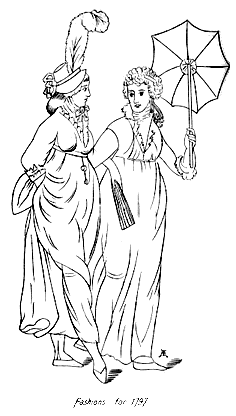 ‘Being a companion is probably a very fulfilling life,’ said Melissa supportively. ‘And I’m sure the earl will like you. Now I come to look at them more closely, I can see that your eyes are green. And in candlelight your hair is probably quite Titian. You will write to me, won’t you?’
‘Being a companion is probably a very fulfilling life,’ said Melissa supportively. ‘And I’m sure the earl will like you. Now I come to look at them more closely, I can see that your eyes are green. And in candlelight your hair is probably quite Titian. You will write to me, won’t you?’
‘Of course I will.’
‘Good. Because I don’t want you to go away, Charlotte.’
She looked Very Sad, and I was heartened to know she would miss me.
'I won't have anyone to talk to when you've gone,' she said, 'and I’m having problems of my own.'
I was all agog.
‘I overheard Mrs Dawkins talking today, and I think, from something she said, that the curate’s engaged.’
‘So what are you going to do? Are you going to ask him outright?’
Melissa chewed her lip. ‘I don’t know. Do you think I should?’
‘I don’t know either.’
‘Because if I do, and he is, I might burst into tears, which might be awkward. And if he isn’t, I might shout ‘Hooray!’ and throw my arms round his neck, and that would be even more awkward.’
‘You could always pretend you’ve had a letter containing either bad news or good news and blame your outburst on that.’
‘Yes, I could, couldn’t I?’ she said, brightening. ‘Do you know, Charlotte, I think I will.’
Came away with the smug feeling that I have solved Melissa’s problems and am a mature, sensible woman after all.
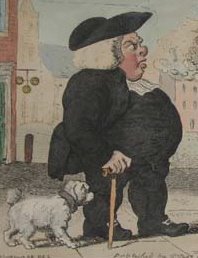 January 17th
January 17th
10 o’clock
I’d hardly finished breakfast when Melissa walked past the window and gesticulated wildly, indicating she wanted me to come into the garden. I made an excuse to Mama and Susan and went outside.
‘What’s happened?’ I asked her.
‘It’s the worst news. He’s not only engaged, he’s married. Oh, Charlotte, I did so love him.’
I patted Melissa on the back. She’s only known him for two weeks, but it seemed cruel under the circumstances to say so.
‘He was so handsome, and so kind, and so intelligent,’ she said, sobbing into her lace handkerchief.
‘But he was a bit on the tubby side,’ I reminded her. ‘And there’ll be other curates. You were devastated when Mr Green started avoiding you, but you got over it.’
‘That was different.’
‘And when Mr Frampton revealed that he never intended to marry, you recovered.’
‘I can’t expect you to understand, you’ve never been in love,’ sobbed Melissa.
‘If I get the job with Lord Winters, you can come and visit me,’ I said. ‘Perhaps there’ll be a nice young curate in the local church.’
Melissa said that no one could be like Mr Thomson, but she started to sob less and soon she dried her eyes and said that yes, she would come and visit me at Lord Winters’ house, and perhaps there might be a church where she could Do Good Works, and if it happened to have a curate, she would help him to Do Good Works, too.
Amanda Grange
 ‘Being a companion is probably a very fulfilling life,’ said Melissa supportively. ‘And I’m sure the earl will like you. Now I come to look at them more closely, I can see that your eyes are green. And in candlelight your hair is probably quite Titian. You will write to me, won’t you?’
‘Being a companion is probably a very fulfilling life,’ said Melissa supportively. ‘And I’m sure the earl will like you. Now I come to look at them more closely, I can see that your eyes are green. And in candlelight your hair is probably quite Titian. You will write to me, won’t you?’‘Of course I will.’
‘Good. Because I don’t want you to go away, Charlotte.’
She looked Very Sad, and I was heartened to know she would miss me.
'I won't have anyone to talk to when you've gone,' she said, 'and I’m having problems of my own.'
I was all agog.
‘I overheard Mrs Dawkins talking today, and I think, from something she said, that the curate’s engaged.’
‘So what are you going to do? Are you going to ask him outright?’
Melissa chewed her lip. ‘I don’t know. Do you think I should?’
‘I don’t know either.’
‘Because if I do, and he is, I might burst into tears, which might be awkward. And if he isn’t, I might shout ‘Hooray!’ and throw my arms round his neck, and that would be even more awkward.’
‘You could always pretend you’ve had a letter containing either bad news or good news and blame your outburst on that.’
‘Yes, I could, couldn’t I?’ she said, brightening. ‘Do you know, Charlotte, I think I will.’
Came away with the smug feeling that I have solved Melissa’s problems and am a mature, sensible woman after all.
 January 17th
January 17th10 o’clock
I’d hardly finished breakfast when Melissa walked past the window and gesticulated wildly, indicating she wanted me to come into the garden. I made an excuse to Mama and Susan and went outside.
‘What’s happened?’ I asked her.
‘It’s the worst news. He’s not only engaged, he’s married. Oh, Charlotte, I did so love him.’
I patted Melissa on the back. She’s only known him for two weeks, but it seemed cruel under the circumstances to say so.
‘He was so handsome, and so kind, and so intelligent,’ she said, sobbing into her lace handkerchief.
‘But he was a bit on the tubby side,’ I reminded her. ‘And there’ll be other curates. You were devastated when Mr Green started avoiding you, but you got over it.’
‘That was different.’
‘And when Mr Frampton revealed that he never intended to marry, you recovered.’
‘I can’t expect you to understand, you’ve never been in love,’ sobbed Melissa.
‘If I get the job with Lord Winters, you can come and visit me,’ I said. ‘Perhaps there’ll be a nice young curate in the local church.’
Melissa said that no one could be like Mr Thomson, but she started to sob less and soon she dried her eyes and said that yes, she would come and visit me at Lord Winters’ house, and perhaps there might be a church where she could Do Good Works, and if it happened to have a curate, she would help him to Do Good Works, too.
Amanda Grange
Monday, June 05, 2006
Exciting Times

June is a very exciting time for me: not only is my latest book, GENTLEMEN IN QUESTION, published by Robert Hale Ltd at the end of the month, but another of my novels, FORTUNE'S LADY, is now available as a e-book from www.Belgravehouse.com. Both these books are classed as "Regency" period, although they are very different in tone. GENTLEMEN IN QUESTION is set in 1792, just as England is coming to the end of an uneasy peace with France as it plunges deeper into its bloody Revolution. England is awash with rumours of French spies, setting the scene for our heroine to be plunged into a dangerous adventure. FORTUNE'S LADY is set in London after Waterloo and Lady Rosalyn Tremayne is in no danger of losing her life, only her honour, her reputation and her happiness. Two very different books, yet both were a joy a write.
 Melinda Hammond
Melinda Hammond
Jane Eyre being filmed at Haddon Hall

Haddon Hall is a fortified medieval manor house dating from the 12th Century, and is the home of Lord and Lady Edward Manners whose family have owned it since 1567. Situated in Bakewell, Derbyshire, England, it's well worth a visit, especially for those with an interest in Jane Eyre. It was used as a location in the Zeferelli film of Jane Eyre, and it is to be used again in the forthcoming TV miniseries.
Friday, June 02, 2006
Win a copy of Gentlemen in Question
For a chance to win Melinda Hammond's wonderful new Regency, Gentlemen in question, go on over to Regency Authors UK and enter the competition.
 The story begins at the harbour in Rye, Sussex on a blustery November day in 1792. Madeleine Sedgewick is meeting her cousin, one of the many French aristocrats forced by the Revolution to leave their homeland. Madeleine's life so far has been uneventful, but with the arrival of the Comte du Viviere she finds herself entangled in a dangerous web of intrigue and suspicion and she has to decide if her cousin is a victim or a villain.
The story begins at the harbour in Rye, Sussex on a blustery November day in 1792. Madeleine Sedgewick is meeting her cousin, one of the many French aristocrats forced by the Revolution to leave their homeland. Madeleine's life so far has been uneventful, but with the arrival of the Comte du Viviere she finds herself entangled in a dangerous web of intrigue and suspicion and she has to decide if her cousin is a victim or a villain.
The question that haunts Madeleine is, how can she tell? There are two men – both of them suave, urbane and good-looking (this is a romance, after all): one is her cousin, the Comte du Viviere, who has left his homeland and everything he knows, fleeing from the terror of the French Revolution. The other is Beau Hauxwell, a rich English gentleman of fashion. Madeleine likes them both, but how is she to know which one is to be trusted?
The book is hardback, and a great addition to any romance lover's shelf!
 The story begins at the harbour in Rye, Sussex on a blustery November day in 1792. Madeleine Sedgewick is meeting her cousin, one of the many French aristocrats forced by the Revolution to leave their homeland. Madeleine's life so far has been uneventful, but with the arrival of the Comte du Viviere she finds herself entangled in a dangerous web of intrigue and suspicion and she has to decide if her cousin is a victim or a villain.
The story begins at the harbour in Rye, Sussex on a blustery November day in 1792. Madeleine Sedgewick is meeting her cousin, one of the many French aristocrats forced by the Revolution to leave their homeland. Madeleine's life so far has been uneventful, but with the arrival of the Comte du Viviere she finds herself entangled in a dangerous web of intrigue and suspicion and she has to decide if her cousin is a victim or a villain.The question that haunts Madeleine is, how can she tell? There are two men – both of them suave, urbane and good-looking (this is a romance, after all): one is her cousin, the Comte du Viviere, who has left his homeland and everything he knows, fleeing from the terror of the French Revolution. The other is Beau Hauxwell, a rich English gentleman of fashion. Madeleine likes them both, but how is she to know which one is to be trusted?
The book is hardback, and a great addition to any romance lover's shelf!
Thursday, June 01, 2006
Devil's Prize

The background to my current work-in-progress, Devil's Prize, is smuggling in Cornwall in the late 1790s. The Cornish believed the government in London knew little and cared less about the grinding poverty in which they lived. In their opinion it was the natural right of every Cornishman to buy goods as cheaply as possible, and they had no intention of obeying laws against smuggling that were enforced by people given a share of the goods that were seized.
The strange object in the picture beside the pistol is a spout lantern. These were specially made for smugglers by local craftsmen. The long spout showed a pinpoint of light in only one direction. This made it ideal for signalling boats loaded with contraband.
It's been fascinating to discover that words and phrases we use now, often in a different context, were actually coined by smugglers and those determined to catch them.
The coast is clear is a term that originated with smugglers. So too is a flash in the pan which was the signal made by a special pistol to inform the captain of a smuggling boat that it was safe to land his cargo.
In the late 18th century smugglers used to wear leather seaboots that were thigh-high and wide at the top, ideal for hiding and bringing ashore contraband tobacco. Hence the term bootlegger.
Rummage originated with revenue men to describe their searches for hidden contraband.
Brandy was transported in tubs called half-ankers weighing roughly 50 lbs each. These were carried from beach to hiding place (or waiting pack-horses) by men strong enough to manage two at a time suspended from a short pole. But with such a burden they were vulnerable to attack. Protecting them was the job of batmen armed with staves and cudgels. Some occasionally carried a pistol, though being caught with a firearm while smuggling meant an automatic death sentence.
More next time.
Jane Jackson.
Dangerous Waters Pub. Robert Hale 2006. Available from www.Amazon.co.uk
Subscribe to:
Comments (Atom)
